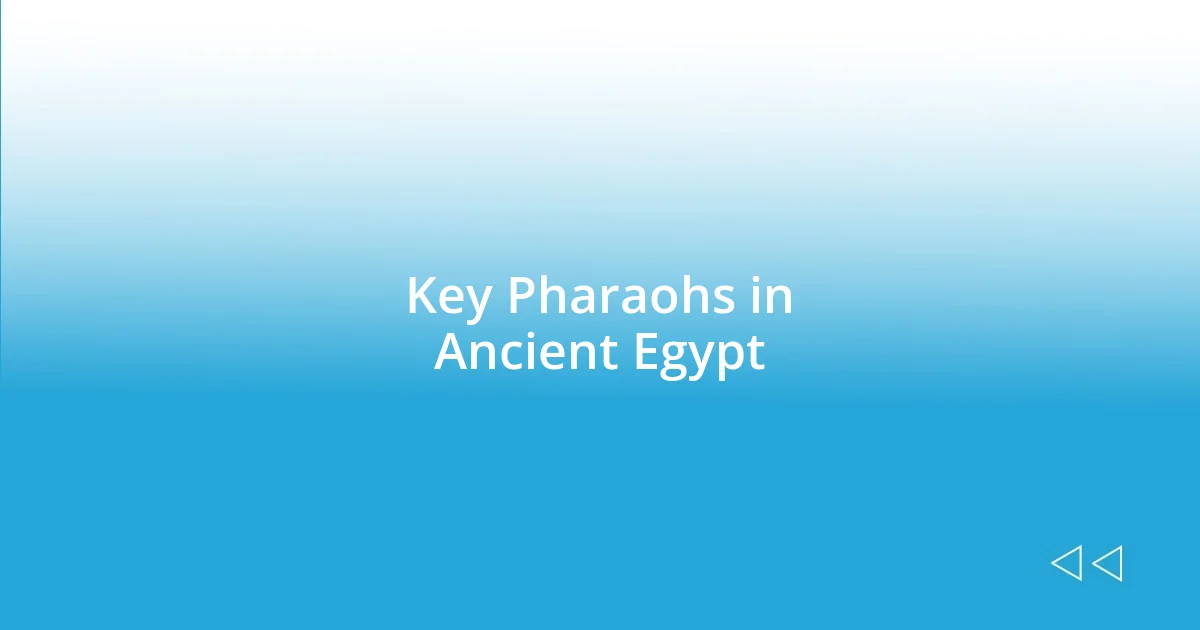Key takeaways:
- Pharaohs served as divine rulers in ancient Egypt, balancing luxury and immense responsibilities while influencing society and culture.
- Key pharaohs like Ramses II, Tutankhamun, and Hatshepsut showcased diverse leadership styles, shaping the course of Egyptian history through their achievements and personal stories.
- The legacy of the pharaohs continues to inspire modern culture, architecture, and concepts of leadership, reflecting their lasting impact on society and governance.

Introduction to Pharaohs’ Life
Pharaohs lived lives steeped in both grandeur and responsibility. Think about it: they were not just rulers but also regarded as divine intermediaries between the gods and their people. I often wonder how it felt to bear such immense pressure, knowing that the prosperity of an entire civilization rested on your shoulders.
Among the opulent temples and elaborate pyramids lay the heart of ancient Egypt’s society. To me, it seems that every aspect of a Pharaoh’s life—from their lavish banquets to their meticulous burial practices—was designed to reflect their power and status. I can almost picture the vibrant colors of their attire and the solemnity of their rituals. Don’t you find it fascinating how the facade of power camouflaged the burdens they carried?
We often hear tales of their riches and monumental achievements, yet the personal stories behind these figures intrigue me even more. How did they balance their role as a military leader and a spiritual figure? I think about the emotional weight they must have felt when decisions meant life or death for their subjects. Even in a life replete with luxury, their humanity is often overshadowed by their legendary status.

Key Pharaohs in Ancient Egypt
When considering key pharaohs, names like Ramses II and Tutankhamun inevitably come to mind. Their legacies are fascinating not only for their accomplishments but also for the stories etched in history surrounding them. I often reflect on how these leaders shaped not just their reigns but also the entire course of Egyptian history. For instance, Ramses II, known as Ramses the Great, is celebrated for his military conquests and monumental constructions. It’s almost as if you can feel his ambition radiating off the pyramids and temples he left behind.
- Ramses II (Ramses the Great): Reigned from 1279 to 1213 BCE; known for military prowess and extensive building projects, including Abu Simbel.
- Tutankhamun: Reigned from 1332 to 1323 BCE; famous for his intact tomb discovered in 1922, shedding light on royal life and burial practices.
- Hatshepsut: One of the few female pharaohs; she expanded trade networks and built spectacular monuments, such as her mortuary temple at Deir el-Bahari.
- Akhenaten: Known for his radical shift toward monotheism, worshiping Aten; his reign marked a significant cultural and religious upheaval.
Thinking about these figures, I can’t help but be captivated by their differing approaches to leadership and worship. Hatshepsut, for example, must have experienced unique challenges being one of the few women in a position of such power. It’s intriguing to ponder how she navigated the male-dominated hierarchy of ancient Egypt while still managing to leave a lasting mark. In my mind, her story is a testament to resilience—an embodiment of strength in a time when it was rare to see a woman as a ruler.

Daily Life of the Pharaohs
Pharaohs experienced a daily life that blended luxury with high-stakes duties. I often picture them waking up in their vast palaces, surrounded by servants attending to their every need. Their days would likely begin with rituals dedicated to the gods, reaffirming their divine right to rule. The thought of them donning ornate jewelry and fine linen garments instantly transports me to that bustling ancient world where every detail was meticulously crafted to reflect their status.
But let’s not forget the weight of their responsibilities. In the evenings, along with their advisors, they decided on urgent matters of governance and military strategy. I imagine how they must have felt—caught between the lavish feasts they hosted and the daunting realities of leading a nation. It’s quite stirring to think about those moments of quiet reflection amid the noise of their court. Would they have fully grasped how their decisions shaped not just the present, but history itself?
Engaging with their families offered a glimpse of normalcy in their extraordinary lives, though even family dutifully reflected their societal roles. I’ve read records of pharaohs spending time with their children and arranging marriages, which, in my view, were not just acts of love but strategic moves to secure alliances and power. It’s a poignant reminder of how, beneath the regal façade, human connections remained essential, even for someone whose life appeared so detached from the daily concerns of ordinary people.
| Aspect | Description |
|---|---|
| Morning Rituals | Pharaohs began their day with religious ceremonies to honor the gods, reinforcing their divine rule. |
| Daily Responsibilities | Governance, military decisions, and administrative duties filled their afternoons, merging luxury with duty. |
| Social Life | Evenings included lavish banquets with nobles, yet behind the festivities lay careful political maneuvering. |
| Family Life | Pharaohs prioritized family ties, recognizing the importance of alliances, even in personal relationships. |

Pharaohs’ Role in Religion
In ancient Egypt, the pharaoh’s role in religion was not just ceremonial; it was foundational to their identity as leaders. I often marvel at how the pharaoh was considered a living god, a bridge between the divine and the mortal. This connection must have shaped their actions in profound ways, as every decision they made reflected divine will. Can you imagine the immense pressure they felt, knowing that any misstep could be seen as a failure in their sacred duty?
Rituals played a pivotal role in reinforcing the pharaoh’s divinity. From daily offerings to grand ceremonies, these practices ensured that the gods’ favor was secured. Picture a pharaoh in a temple, surrounded by priests, offering rich gifts to the deities—an expression of gratitude and a way to maintain cosmic order. Such moments were not merely about faith; they were strategic maneuvers to ensure their reign was legitimized and protected.
The pharaohs’ connection to religion extended beyond their own lives. Each monumental structure, like the awe-inspiring temples I envision, served as a tribute to the gods, aiming to secure immortality for both the pharaoh and the nation. I can’t help but feel a sense of awe imagining these grand edifices rising from the desert, built with the hope of eternal praise. How fascinating that these structures were both a testament to their power and a sincere act of devotion!

Pharaohs and Their Dynasties
Pharaohs and their dynasties tell a captivating tale of power and legacy. Each dynasty, from the Old Kingdom’s Pyramid Builders to the New Kingdom’s imperial rulers, had unique characteristics and contributions. I find it intriguing how these dynasties often reflected the personalities and ambitions of their leaders. For instance, could a single pharaoh like Ramses II really change the course of history with his military campaigns and monumental building projects? It’s a compelling thought.
As I dive deeper into the stories of these dynasties, I’m struck by the complex relationships between rival pharaohs. Power struggles often defined their reigns, as dynasties vied for control over territory and resources. I recall reading about the tumultuous transition from the Middle Kingdom to the Second Intermediate Period, which was marked by foreign invasion and internal strife. It lends a touch of drama to the ancient narrative, doesn’t it?
Dynasty after dynasty, there are echoes of glory and despair. The fascinating cycle of rise and fall captures my imagination as I consider the many factors that influenced their success or decline. Perhaps it was natural disasters or social upheaval that led to their eventual downfall, sparking introspection about how fragile power can be. That duality of strength and vulnerability seems to resonate throughout their stories, providing valuable lessons in resilience and ambition even today.

Influence of Pharaohs on Society
The influence of pharaohs on society was profound and far-reaching. They were not just rulers but the epicenter of governance, culture, and daily life. It’s fascinating to think how their every decree could ripple through the social fabric, altering the lives of farmers, artisans, and priests alike. For instance, when a pharaoh decided to build a monumental structure, like a temple, it wasn’t just about glory; it created thousands of jobs and stimulated local economies, thus weaving the populace into a collective effort.
I often reflect on the social hierarchies established by these leaders. The pharaohs had the power to elevate individuals or entire groups based on loyalty or service, dictating who flourished and who struggled. Can you imagine being a craftsman in ancient Egypt, given the chance to create a statue for your ruler? That kind of opportunity must have instilled a sense of pride and purpose, aligning personal success with the glory of the state. Yet, this system also meant that any disfavor could lead to swift downfall, showcasing the delicate balance of power in their hands.
Moreover, the pharaohs’ influence extended deep into cultural aspects, shaping art, literature, and even daily rituals. The manifestations of their reign can still be felt today, as I think about ancient Egyptian motifs and their impact on modern design. How many people today wear colorful jewelry inspired by those ancient artisans? It’s invigorating to think about how the legacy of the pharaohs continues to inspire creativity, even millennia later. Their rule wasn’t merely a time period; it was a crucial chapter that laid the groundwork for societal values that persist through the ages.

Legacy of the Pharaohs Today
Certainly! Here’s how I would express my thoughts on the “Legacy of the Pharaohs Today,” while incorporating personal anecdotes and engaging insights:
The legacy of the pharaohs resonates powerfully in modern culture, often reflected in literature, films, and architecture. I remember watching a documentary that showcased how the iconic pyramids continue to captivate millions. Their engineering marvel has inspired contemporary architects, isn’t it fascinating how these ancient structures still influence design principles today? Whether consciously or subconsciously, we often draw inspiration from the grandeur of these monumental feats.
One vivid memory I have is visiting a museum and being utterly spellbound by the artifacts from ancient Egypt. Standing before a beautifully crafted piece of jewelry or a stunning sarcophagus, I felt a connection to the lives of those who came before us. It struck me that each item not only served a purpose in their time but continues to tell stories that enrich our understanding of human history. The emotional weight of these pieces can’t be overstated; they whisper the tales of aspirations, beliefs, and artistry that shaped an entire civilization.
Moreover, the concepts of leadership and governance established by pharaohs linger in our political and social structures today. I often find myself contemplating how their authority and connection to the divine have influenced our views on leadership. When we think about powerful leaders in the modern world, don’t you see echoes of those ancient rulers who wielded their influence in both benevolent and tyrannical ways? This connection highlights the ongoing dialogue about power, responsibility, and the impacts of leadership that spans across the ages, providing a mirror to reflect upon our own times.
















